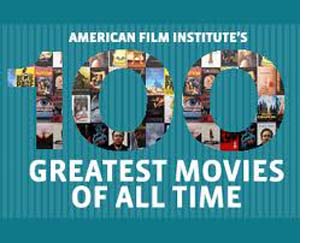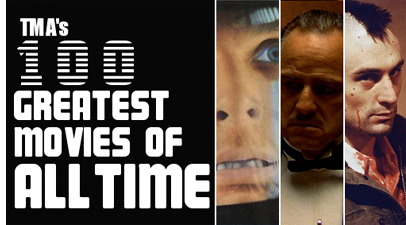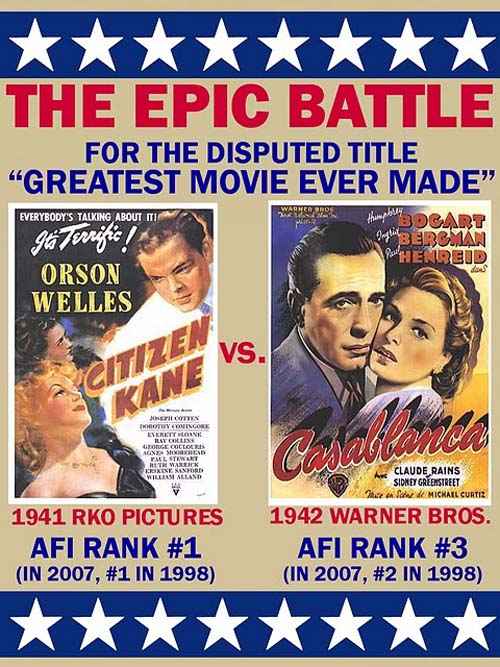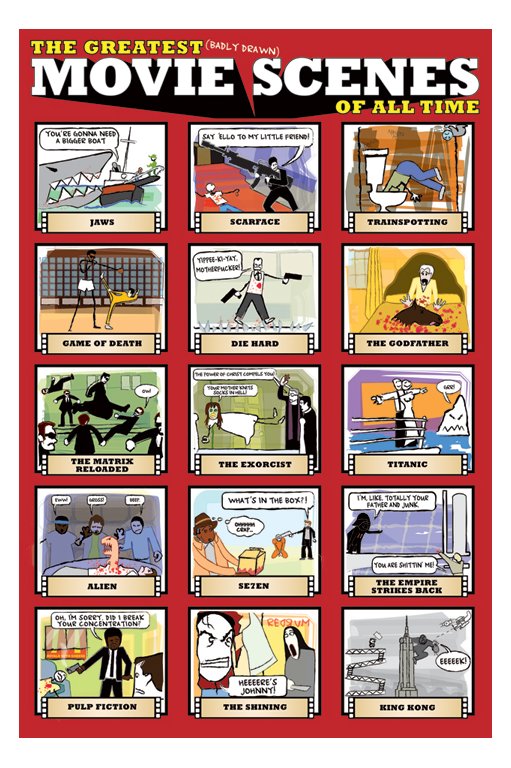Pleased to meet you. What’s the greatest movie ever made?
Friday | March 18, 2011 open printable version
open printable version
(From the Seth Saith blog)
Kristin here:
Way back in January Jim Emerson participated in the “Movie Tree House” conversation on Sergio Leone and the Infield Fly Rule. On January 14, his blog recounted his discussion of the differences between “average viewers” and those of us who are more intensely involved in films in one way or another:
I met a very nice, intelligent woman (maybe ten years older than me) at a New Year’s Eve party and she told me “The King’s Speech” was the best movie she’d ever seen. I responded politely by showing (genuine) enthusiasm for Geoffrey Rush’s performance. But I don’t know what to say to something like that. I mean, I had no reason or desire to dismiss her, but it wasn’t the kind of statement that calls for critical analysis, either. It was just social small talk. But I believe she was quite moved by the film. And, yes, there’s nothing at all wrong with that.
He added:
I thought of saying, “Wow. My favorite movie is ‘Nashville.’ Or maybe ‘Chinatown.’ Or ‘Only Angels Have Wings.'” But I didn’t think the conversation would have much opportunity to go anywhere from there, so I didn’t.
I suspect Jim’s experience is common among people whose main vocation is writing about films. When I meet someone who isn’t a film buff or scholar, he or she almost inevitably asks one of two questions: “What is your favorite film?” or “What do you think is the greatest film ever made?” From the looks on their faces, I suspect they really want to know the answer and think that it will be interesting, even gratifying. After all, meeting a film critic or historian is less common and more potentially interesting than meeting a mathematician.
Up to now, I have generally answered honestly that I think the greatest film ever made is Jacques Tati’s Play Time and that it’s probably my favorite as well. Or I say that it’s hard to choose, but some candidates would be  Ozu Yasujiro’s Late Spring, Jean Renoir’s The Rules of the Game, Sergei Eisenstein’s Ivan the Terrible, and Play Time. Almost invariably the smile on my interlocutor’s face fades into disappointment as he or she admits to never having heard of any of these films, let alone having seen them. Awkward pause, with conversation turning to other matters or my making a feeble attempt to say sometime to encourage the person to give these films a try.
Ozu Yasujiro’s Late Spring, Jean Renoir’s The Rules of the Game, Sergei Eisenstein’s Ivan the Terrible, and Play Time. Almost invariably the smile on my interlocutor’s face fades into disappointment as he or she admits to never having heard of any of these films, let alone having seen them. Awkward pause, with conversation turning to other matters or my making a feeble attempt to say sometime to encourage the person to give these films a try.
I think I’ve come up with a better way to answer these questions. I’ll say something like, “Well, lately I’ve really enjoyed True Grit and Toy Story 3.” This dodges the question, but the person is bound to have heard of these, likely to have seen one or both, and may well have something to say about them—though I hope it isn’t “Yes, that’s the best film I’ve ever seen.”
Maybe that tactic will work. After all, most movie-goers work on what in cognitive psychology is called “the recency effect.” Our memories of things we’ve just experienced are more vivid in our minds than those from longer ago, even though those older experiences may have seemed equally intense or pleasurable at the time.
I ran across a good example of this effect in an Amazon review of True Grit posted by Harold Greene. Giving the film five stars, he enthuses, “I am reluctant to declare it THE best movie I have ever seen in my life but in five weeks watching it every Saturday night I can recall none to surpass it.” As a fan of True Grit and the Coen Brothers, I would believe that possibly it is the best film Mr. Greene has ever seen. But it could equally be that the intense repetition of viewings may have solidified the recency effect and diminished his memory of other films that he esteemed equally at the time.
More generally, the recency effect tends to be borne out when one of my colleagues in film studies here at the University of Wisconsin-Madison surveys their students at the beginning of a course. The goal is to find out something about their knowledge of film going into the class. One question, “What is your favorite film?” almost invariably elicits a title released in the past year or so.
So I suspect that the party-goer asking about my favorite film would be satisfied with my talking about recent movies I’ve enjoyed. The real puzzle, though, is why such people would ask such questions to begin with.
One possibility is that most people have very little sense that there is a vast body of movies out there, from over a century and from many significant filmmaking countries. Their impression of film history, as reflected in the popular media, could reasonably be that the film I might name as the greatest is probably one they’ve heard of, maybe Casablanca or Citizen Kane or The Godfather or La Dolce Vita or even Avatar.
Could it be that my questioner is hoping, probably without realizing it, that I will name his or her own favorite film? Or at least a title that he or she has seen and enjoyed? Or at least heard of? In the latter case, the person can hold up his or her side of the conversation by responding, “Oh, I’ve heard of that and have been meaning to watch it. I must put it in my Netflix queue.” A satisfactory conclusion to that little stretch of social interaction, and it does happen, albeit rarely.
I try to imagine whether scholars of opera or poetry get such questions at parties. Does someone who has just been introduced to them ask what their favorite opera or poem is? Maybe. I wouldn’t. My typical response on learning that a perfect stranger standing in front of me is a professor of something is to ask what his or her area of specialization is, hoping that it’s something I know a bit about (Vivaldi operas as opposed to Verdi, nineteenth-century Victorian novels as opposed to Renaissance poetry).
to Verdi, nineteenth-century Victorian novels as opposed to Renaissance poetry).
I have to admit, some people I meet at parties do launch in by asking me what areas of film I study, which makes the subsequent conversation less likely to end in mutual embarrassment. That is, with me looking like a pointy-headed, ivory-tower intellectual who wouldn’t be caught dead watching Cedar Rapids (which I’m actually looking forward to seeing) and my new acquaintance looking like an ignorant clod who doesn’t look beyond this year’s Oscar nominees (even though he or she has probably in reality seen quite a lot of excellent movies).
This entry on Jim’s blog led to a touchy exchange in his comments section about whether he and the other participants in the dialogue were being condescending to “average viewers.” This sort of disagreement seems inevitable, since people who know a great deal about any subject are likely to seem condescending to people who don’t, even if that is not their intention. But the question I’m asking is not whether “average viewers” have good taste. Some do, some don’t. So far I’ve just been trying to figure out why many of them seem determined to ask experts questions that will very likely expose their own lack of knowledge.
Beyond that issue, though, is the symptomatic implication of these two nearly universal cocktail-party questions. I think people are more apt to ask “What do you think the greatest film is?” than “What do you think the greatest opera is?” because film is still taken less seriously as an art-form than are the “high” arts. Most people think they know more about film than they do about opera because almost anyone you and I are likely to meet goes to movies more than to operas. The fact that a steady diet of well-reviewed, even Oscar-nominated Hollywood films remains only a tiny slice of the entire range of surviving movies made so far doesn’t occur to them. The same is true even for those who see the occasional indie or foreign-language film.
It used to be that a good liberal-arts education gave a young person a solid foundation in fields like music and art. I took two four-credit semesters of classical-music appreciation as a freshman and have benefited ever since. I took literature courses, and although I took only one semester of art appreciation, I have filled in by visiting museums all over the world. Even so, I would be cautious in trying to make conversation about topics like ballet, which I realize I know very little about.
Yet, the “What’s your favorite film?” question doesn’t just come from neighbors I see only at the annual block-party potluck or over bed-and-breakfast buffets. It comes from college professors who themselves are often specialists in one of the arts. They probably would feel, as well-rounded intellectuals, required to know at least something about the other arts—except film.
David was once talking with a distinguished literary scholar who would have been appalled if someone in a university had never heard of Faulkner or Thomas Mann. But when David said he admired many Japanese films, the scholar asked incredulously, “All those Godzilla movies?”
That’s really the crux of what bothers me about the awkward great-film/favorite-film question. If it’s a non-academic who asks it, it tends to be a conversation-stopper, which is unfortunate. But anyone is entitled to love the movies they want to love and to believe, if they wish, that Avatar is the greatest film ever made.
But when academics who would claim to be well-educated in the arts look blank when I mention The Rules of the Game or one of the other likely masterpieces of world cinema, I do mentally pass judgment. Is it more important to be aware of Monteverdi’s Orfeo or Velasquez’s Las Meninas than of Renoir’s film? Obviously I would say no. Yet I don’t think that these academics feel particularly embarrassed at not recognizing the title of a mere film.
This is not to say that all liberal-arts academics in other fields are ignorant of film and its history. On the contrary, we have friends who certainly know as much about the subject as we do about any other art form. But on the whole, in-depth knowledge of film is fairly uncommon across the campus. There are physicists who play piano sonatas and biologists who love painting, but those typically aren’t the people showing up for our Cinematheque screenings. The question isn’t merely one of taste either. In universities, people in the other arts vote on funding for film programs. If they deep down consider film a lesser art form and hence an inconsequential subject of study, we can expect less support, or perhaps the sort of condescending support that says, in effect, “Well, I suppose that since it’s popular with students we should go ahead . . .”
A final note. If anything I have said here sounds “elitist,” you might consider the vast movement we see occurring in this country’s politics, especially on the far right, where any learning at all is equated with elitism and any experience in public office is equated with being tainted. When our educational system is being systematically downgraded, expecting people to learn things is simple common sense.















